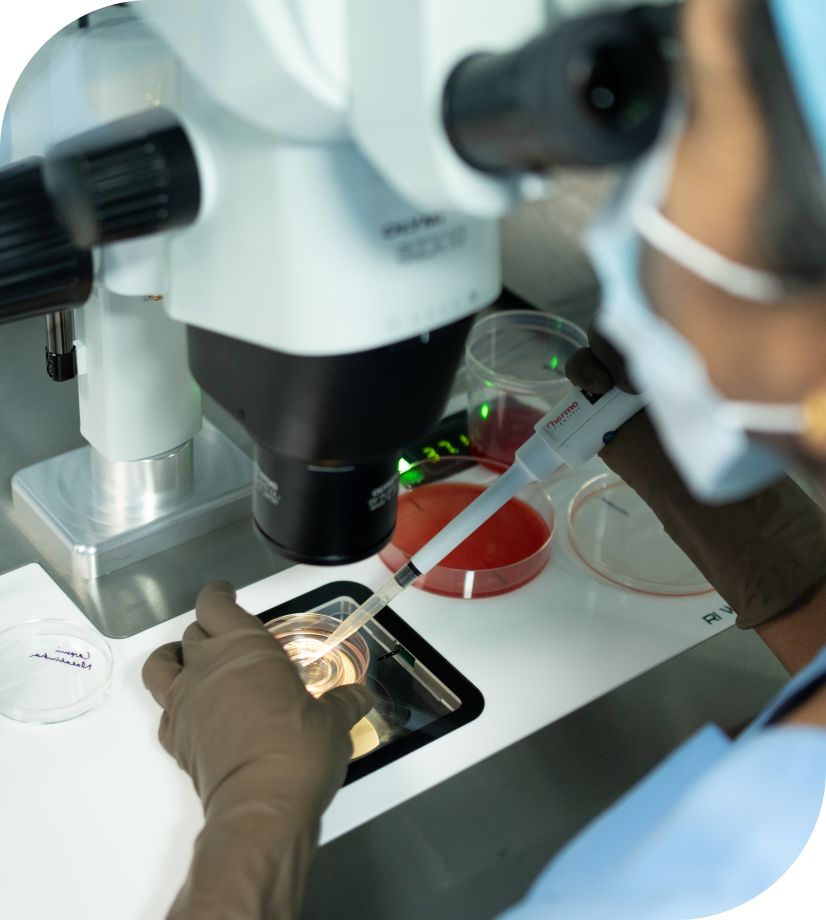EMBRYOLOGY LAB

Precision, Safety, and Innovation at the Core
At the heart of our advanced fertility centre lies the Embryology Laboratory — a cutting-edge facility meticulously designed to support the most delicate and crucial phases of assisted reproductive treatments. Our lab combines superior infrastructure, world-class equipment, and highly trained professionals to deliver outstanding success rates in fertility care.
World-Class Infrastructure for Maximum Embryo Safety
Our embryology lab is built to international Class 1000 cleanroom standards, ensuring an ultra-sterile environment that protects gametes and embryos from any potential contaminants. The lab is equipped with HEPA-filtered air systems, VOC-free surfaces, antistatic flooring, and positive pressure zones to maintain purity and precision. Temperature, humidity, and air quality are rigorously monitored 24/7 to simulate the optimal conditions of the human body.
World-RFID-Based Electronic Witnessing System (EWS)
To guarantee the highest level of safety and accuracy, our lab employs a Radio-Frequency Identification (RFID)-based Electronic Witnessing System. This cutting-edge technology tracks and verifies every step in the handling of gametes and embryos — from retrieval to fertilization and embryo transfer. It ensures that there is no mix-up or human error, offering our patients peace of mind with every procedure. The RFID tags automatically match each sample to the correct patient, and the system requires verification before every critical action, ensuring unmatched traceability and accountability.
Advanced Equipment and Techniques
Our lab is equipped with top-tier incubators, micromanipulation systems, and vitrification tools. These include high-precision ICSI (Intracytoplasmic Sperm Injection) stations for fertilization, as well as closed system vitrification setups for safe and rapid embryo and oocyte freezing. We use laminar airflow workstations, specialized embryo culture media, and consistent monitoring systems to create a nurturing environment for embryo development.
A key highlight is our use of IMSI (Intracytoplasmic Morphologically Selected Sperm Injection). This advanced technique involves selecting sperm under extremely high magnification (up to 6000x), enabling our embryologists to identify and choose sperm with the best morphology and structural integrity. IMSI significantly enhances fertilization quality and may improve implantation and pregnancy outcomes, particularly in cases of male factor infertility or repeated IVF failure.
Embryo Biopsy for Preimplantation Genetic Testing (PGT)
Our embryologists are skilled in performing delicate embryo biopsies to enable Preimplantation Genetic Testing (PGT). This procedure involves carefully removing a few cells from a day-5 blastocyst without harming the embryo’s viability. The biopsied cells are analyzed for genetic abnormalities, helping us select chromosomally normal embryos for transfer. PGT enhances success rates, especially for patients with recurrent pregnancy loss, advanced maternal age, or known genetic conditions.
Expert Team and Rigorous Protocols
Our team of embryologists brings years of experience and is certified in advanced ART techniques. Each process follows strict SOPs, with dual witnessing, digital records, and continuous quality checks. Every aspect of embryo culture and handling is documented with precision, ensuring a transparent and secure experience for every patient.
- In Conclusion, our embryology lab is more than a technical space — it’s a centre of excellence, where technology, precision, and compassion come together to turn hope into reality. With best-in-class infrastructure and unwavering commitment to safety, we are proud to offer a globally benchmarked environment for your fertility journey.

FAQs
What is an embryology lab in IVF treatment?
An embryology lab is a highly specialized facility within an IVF clinic where eggs and sperm are handled, fertilized, and embryos are cultured. It plays a crucial role in the success of IVF treatment by ensuring optimal conditions for embryo development.
Why is the quality of the embryology lab important for IVF success?
The quality of the embryology lab directly affects IVF success rates. Advanced equipment, strict air quality control, and skilled embryologists help improve embryo quality, implantation chances, and pregnancy outcomes.
What technology is used in a modern embryology lab?
A modern embryology lab uses cutting-edge technology like time-lapse embryo monitoring (EmbryoScope), ICSI micromanipulators, incubators with pH and temperature control, and laser-assisted hatching tools to enhance IVF results.
How are embryos handled and stored in the embryology lab?
Embryos are cultured in incubators that mimic the natural womb environment. For future use, high-quality embryos are frozen through vitrification and stored in cryo-tanks under strict temperature and identification protocols.
What is the role of an embryologist in the IVF lab?
An embryologist handles critical IVF procedures including egg retrieval assessment, sperm preparation, fertilization (IVF or ICSI), embryo grading, and freezing, ensuring the best possible embryo quality for transfer.
What is embryo grading and why does it matter?
Embryo grading evaluates the quality of embryos based on cell division and appearance. High-grade embryos have a better chance of implantation and pregnancy, helping doctors select the best ones for embryo transfer.
How does air quality impact embryo development in the IVF lab?
Embryos are sensitive to environmental conditions. Advanced embryology labs maintain cleanroom air systems with HEPA and VOC filters to reduce contaminants, ensuring a safe environment for embryo culture.
What is time-lapse embryo monitoring and how does it improve IVF outcomes?
Time-lapse embryo monitoring (EmbryoScope) continuously captures embryo development without disturbing culture conditions. This helps embryologists select the most viable embryos, increasing IVF success rates.
